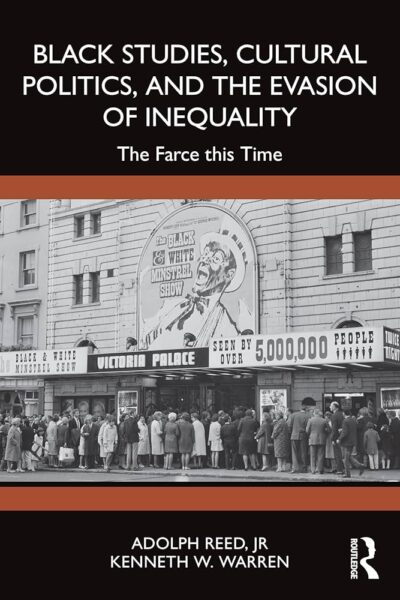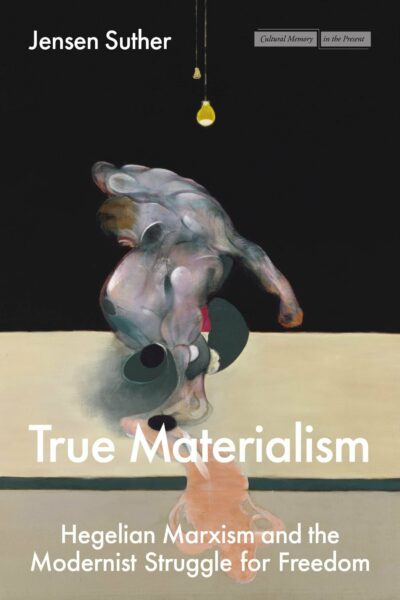Black Studies, Cultural Politics, and the Evasion of Inequality: The Farce this Time

Best takes great pains to describe race as many things: “inheritance,” “legacy,” “lineage,” “affinity,” “subjectivity.” But he avoids the painful truth that race is ideology and that, more particularly, it is the ideology of those who champion such notions as “the black radical tradition” or the “racial wealth gap,” which is to say, those for whom the inadequacy of class analysis for understanding inequality must be stipulated as a point of departure inquiry. What we mean by ideology is not something like “false consciousness” but rather the mechanism that harmonizes the principles you want to believe you hold with what advances your material interest.
Tool or Colleague? The Case against Personhood for AI

Should AI have legal rights? Arguments defending ePersonhood—legal personhood for AI, LLMs, and supposedly autonomous robots—have appeared recently and are taken seriously. Siraganian examines what exactly this could mean, showing how ePersonhood erroneously adapts arguments from corporate personhood and rights for nature. Considering the claims of philosophers, legal thinkers, AI theorists, and Google engineers, as well as the production of social robots like “Sophia” and “Ai-Da,” Siraganian argues that the current deceptive language of AI is really a symptom of the tremendous, still unbridgeable gap between human life and our AI reality.
Was This Trip Really Necessary?

Suther’s goal is to establish new “methodological imperatives.” His way of going about it is characteristically inflationary in terms of proposing new notions, inventing new terminology, and redescribing life itself. But the real test for any new theory is not whether it can offer a structure of thought, but whether that structure has purchase on reality: that is, whether there are things that need to be conceived of in this way. On this front, Suther ultimately fails.
The Dead End of Intentionalism

The ordinary-language assumption that such metaphysical questions are resolved as soon as I raise my hand in a classroom or hug a friend when he tells me she has finally left him is given the lie by its own tacit metaphysics: a picture of reality as comprising two independent orders, one mechanical and complete in itself, the other normative and merely supervenient upon it. This is not a neutral description of our world, but a substantive—and historically specific—way of carving it up. By ordinary language’s own lights, moreover, the modern historical situation in which we experience ourselves as estranged from our own bodies, subject to economic mechanisms we do not control, generates a justified skepticism about the intentionality of our own bodily acts.
Reply to Suther and Bewes

Bewes’ commitment to the (Deleuzian) “cinematic apparatus”—replacing “the unity posited by a human action together with its motivations, causes, and intentions” with “a nondetermined, acentered and decentered perception”—involves the opposite of immanent purposiveness. The point of the wave poem was that you saw the marks on the beach as a poem because you saw in them the act of writing. But the point of Deleuzian immanence is “the rupture in the very relation between the image and action,” that is, between what you see and any action. The achievement of the cinema apparatus is not that it accomplishes the feat of embodying the intention in the work but that it accomplishes the feat of keeping the intention out of the work.
What if? A response to Walter Benn Michaels

What if Michaels, in some small part of himself and irrespective of what he maintains on the page, believes that this forty-year scholarly project might equally have been pursued not in the direction of an ever-expanding notion of intention but in the direction of an ever-diminishing one, a direction whose end would be its elimination altogether?
Issue #53: Normativity, AI, and Photographic Realism

In this issue, Samuel C. Wheeler considers the status of design intention in LLMs, Walter Michaels and Pawel Kaczmarski discuss books by Jensen Suther and Timothy Bewes, Touré Reed is interviewed on “Black History from the Civil Rights Movement to BLM,” Vincent Hiscock discusses the function of idealization in socialist realist photography, and Michael Fried interviews Luc Delahaye.
Mystic Realism

During the Vietnam War, Allan Sekula sought to renovate social realism, a practice he associated with Lewis Hine, whom he called a “realist mystic.” Sekula objected to representations of social misery that make reference to religious iconography. Against Sekula, I argue that Hine’s practice illuminates the indispensability of idealizing means to political identification with or confrontation by a solidaristic “we.” The question remains: How to secure the benefit of a beatifying tradition of religious representation without world-transcending implications? How to produce an adequate social analysis without the dispassion of objectivity?
Not What a Lion Ought to Be

Even if we accept that all life “requires” survival and self-maintenance, it is still not clear why we should think about it in terms of purposes and forms. It is perfectly possible to say that living beings simply sustain themselves and reproduce, and once they no longer do, they cease to be alive. Conversely, something that does not do these things is simply not alive. A dead horse is not a failed live one. Unless, of course, we assume that it was trying to stay alive and failed. But in that case, we have already committed to intention as the source of normativity—that is what “trying and failing” means. Similarly, glaucoma may cause an eye to be unable to satisfy its function, but it is the function desired and imposed by its owner (who presumably intends to use their eye to see things). No notion of natural, biological form is necessary; either intention is present (and calls for interpretation), or it is not (and a causal account is all that is needed). The question of whether horses (or bacteria or trees) are capable of intentions is beside the point at the level of theory.
Action/intention/interpretation/ambition—Timothy Bewes and Jensen Suther

The worry that underlies the sense that both writers and readers can be irresponsible—the writer by failing to have the right relation to her intention, the reader by failing to attend to the writer’s attention—is incoherent. Everyone who produces a speech act produces a text that means what she means by it; everyone who reads one is understanding (or misunderstanding) what she meant by it. This is the force of the non-optional—the reason why intentionalism cannot be a choice—the reason, really, why there is no such thing as intentionalism.
